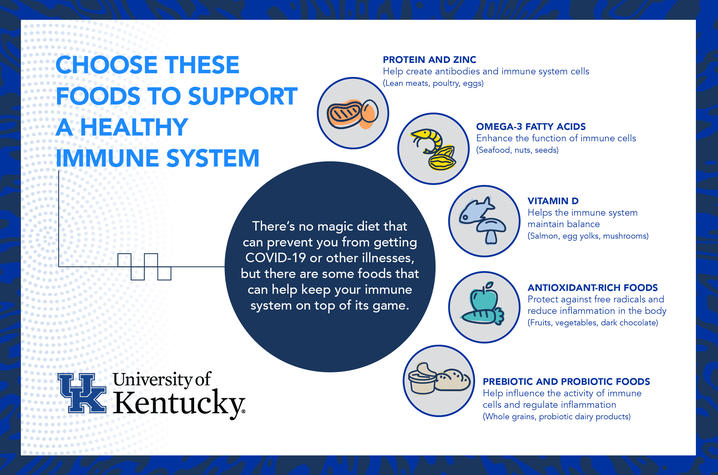Supporting Your Immune System: What You Need to Know

LEXINGTON, Ky. (Oct. 6, 2020) — With flu season upon us and COVID-19 still a serious reality, supporting our immune systems has never been more vital.
You’ve probably heard the expression that you can “boost” your immune system by eating certain foods or by taking specific vitamins. The truth is that there are several foods, vitamins and behaviors that can support your system without overloading it.
“We should think about supporting our immune system as opposed to ‘boosting’ it,” said Heather Norman-Burgdolf, extension specialist for food and nutrition in the University of Kentucky College of Agriculture, Food and Environment. “There are several harmful conditions that are a result of a hyperactive immune system, or one that is in overdrive and causes stress on the body.”
“In reality, we don’t want to ‘boost’ our immune system because it will overreact, and this can actually put more stress on the body,” Norman-Burgdolf said. “Instead, we want to choose foods and healthy lifestyle behaviors that support the immune system to respond appropriately when under stress.”
Norman-Burgdolf says that we should imagine our immune system as our personal protective bodyguard, and that we want to help support it daily from newly emerging infections that may surround us.
“It’s more important to think about what those nutrients are that play an important role in supporting the immune system and not getting so caught up in what those foods are,” she shared. These nutrients include vitamins A, C, D, and E, zinc and selenium.
If you take a look at the nutrition label on any pre-packaged food item, you will see “daily value” listed at the top, which will tell what nutrients the particular product is high in. Norman-Burgdolf says that any food with 20% or more of a specific nutrient is considered high, and that exotic and expensive foods do not always translate to being healthier or more nutritious.
There are many affordable pantry and freezer staples that are going to be high in nutrients that fit any budget. Commonly found foods high in the nutrients listed above include carrots, broccoli, cauliflower, potatoes, fortified cereals, brown rice, oatmeal, seeds, nuts and nut butters.
Adding at least five servings a day of fruits and vegetables will help to ensure your body receives proper nutrients. In addition to eating the rainbow every day, Norman-Burgdolf also recommends staying hydrated by drinking plenty of water, maintaining a routine of physical activity, getting adequate sleep, practicing good hygiene, finding ways to reduce stress, and washing hands often to further support your immune system.
As the state’s flagship, land-grant institution, the University of Kentucky exists to advance the Commonwealth. We do that by preparing the next generation of leaders — placing students at the heart of everything we do — and transforming the lives of Kentuckians through education, research and creative work, service and health care. We pride ourselves on being a catalyst for breakthroughs and a force for healing, a place where ingenuity unfolds. It's all made possible by our people — visionaries, disruptors and pioneers — who make up 200 academic programs, a $476.5 million research and development enterprise and a world-class medical center, all on one campus.




